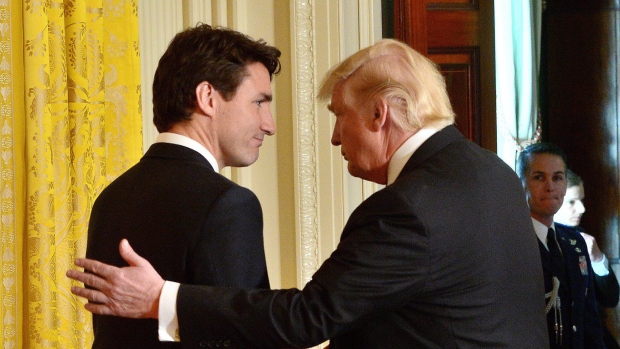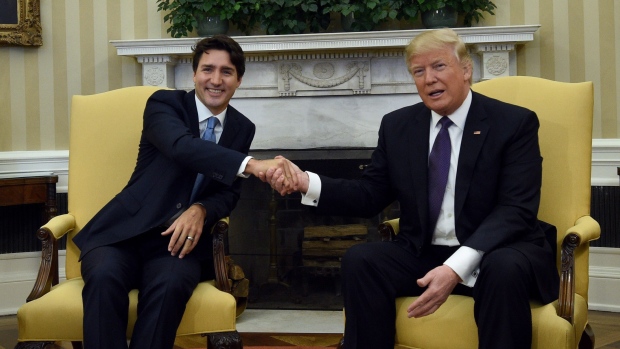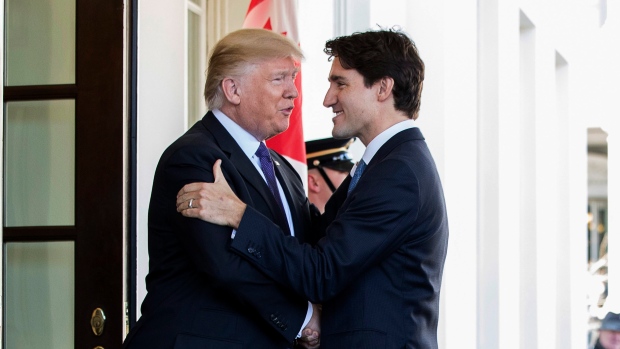Feb 14, 2017
Trump says trade deal with Canada will only be 'tweaked'
, The Canadian Press

WASHINGTON -- U.S. President Donald Trump said Monday that his country's trade issues with Canada are "much less severe" than they are with Mexico.
Trump, who railed against NAFTA almost daily as a candidate, was asked for the first time how Canada fits into his plans for a renegotiation, which could start as early as this spring.
"We have a very outstanding trade relationship with Canada. We'll be tweaking it; we'll be doing certain things that are going to benefit both of our countries," Trump said at a joint news conference with Prime Minister Justin Trudeau.
"It's a much less severe situation than what's taking place on the southern border. On the southern border, for many, many years the transaction was not fair to the United States."
There was no talk of walls, only bridges as Donald Trump had an amiable first meeting with his Canadian counterpart Monday that suggested the northern neighbour would be spared the brunt of his nationalist America-first platform.
The U.S. president spoke about more trade with Canada, a faster-flowing border, joint work on infrastructure projects and reforms to labour mobility as he shelved the tough-talking campaign rhetoric he directed daily at the southern neighbour, Mexico.
He was asked multiple times during a news conference with Prime Minister Justin Trudeau about their decidedly different views on Muslim migration and Syrian refugees — and every time tiptoed around any possible disagreements with Canada.
"America is deeply fortunate to have a neighbour like Canada," Trump said at their White House news conference.
"We have before us the opportunity to build even more bridges and bridges of co-operation and bridges of commerce. Both of us are committed to bringing greater prosperity and opportunity to our people."
The camaraderie and reassuring words could dispel some of the anxiety that has lingered for months, with Trump railing daily against trade deals but saying little about Canada — a top U.S. trading partner and importer of nearly three-quarters of the goods Canada sells abroad.
Signs of that camaraderie included a joint statement so staid and normal, even by the historically placid standard of Canada-U.S. relations, that with some minor exceptions it could have been released by Barack Obama's White House.
The statement skipped over some Obama priorities like climate change and refugees, but emphasized numerous Canadian priorities: customs preclearance projects to speed up the border; more opportunities for labour mobility; and NATO co-operation in eastern Europe.
Both leaders papered over their well-documented differences.
Trudeau made clear there will be disagreements, as with Trump's freeze on Syrian refugees and attempts to limit tourism from certain Muslim-majority countries.
Trudeau said relationships between neighbours are complex, there will be disagreements, and he said the countries will successfully navigate those complexities and still remain close friends.
Invited by a reporter to opine on his differences with Trump, the prime minister said: "The last thing Canadians expect is for me to come down and lecture another country on how they choose to govern themselves."
In fact, the Canadians sought to ensconce themselves on Trump's good side by taking a well-trodden path to it: flattery.
Canada's diplomatic gifts to Trump included a picture of himself — standing next to Pierre Trudeau, in 1981.
Trump said of the gift: "His father I knew, and respected greatly."
That exchange occurred at one of their four events at the White House: there was an Oval Office meeting, lunch, a news conference, and a meeting of a new Canada-U.S. business group for women, co-launched with Trump's daughter Ivanka.
She was seated next to the prime minister at the event.
The idea for such a forum was hatched by Trudeau's entourage. PMO chief of staff Katie Telford pitched the idea during a meeting with Ivanka's husband, Jared Kushner, a fellow real-estate heir and now White House staffer.
During the meeting, Trump heard from Trudeau about the interdependence of North American supply chains, which includes car parts crossing the border more than a half-dozen times.

One business leader also told Trump about how private funding helps build public infrastructure in certain projects in Canada, and he expressed interest in the idea as he plans for a $1 trillion infrastructure plan.
The joint statement with Canada appeared to offer a glimmer of hope on a key infrastructure priority: that the northern neighbour might be spared the Buy American restrictions limiting public projects to U.S. companies.
That issue is not totally within the White House's control, and would likely be decided by Congress. The joint statement said: "Given our shared focus on infrastructure investments, we will encourage opportunities for companies in both countries to create jobs through those investments."
The interactions between staff offered some vivid examples of the Odd Couple-quality to the new continental relationship.
As the delegation walked from the West Wing for lunch inside the White House residence, Canada's Foreign Affairs Minister Chrystia Freeland strolled with Vice-President Mike Pence and top Trump economic adviser Gary Cohn.

Right behind them, chatting and laughing together, were two top strategists seen as intellectual powers behind the throne in their respective countries.
The progressive environmentalist Gerry Butts, Trudeau's old university friend and now his principal adviser, was strolling beside his reverse-image Trumpian alter-ego, Steve Bannon, a driving force behind the president's hardline immigration policies who believes the West is in a civilization war against radical Islam.
With files from BNN and Reuters



